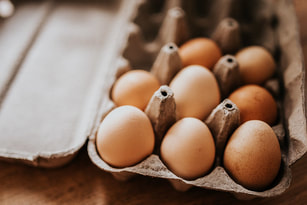 When you think of vitamin D, the first thing you consider is the sun. Humans can convert a chemical precursor from sunlight and utilise it as a source to manufacture our own vitamin D. Dogs and cats, on the other hand, can't meet their requirements from sunlight to produce their own. So where can dogs and cats obtain the correct vitamin D? Good sources come from eggs, pork, wild salmon, sardines and liver ( care needs to be taken when feeding liver as they are abundant in other nutrients and can cause excess problems). While vitamin D can also be found in plant sources in the precursor form D2, cats cannot utilise D2 efficiently. Not enough research has been performed to know if dogs have this ability, so it is preferable that dogs also obtain vitamin D through animals sources ( which contain D3) But here is the catch, you are what you eat plays a role. Let's take the egg, for example—a 2013 study assigned three groups of chickens to various conditions. One group were kept indoors, one outdoors and one with an indoor/outdoor option over 4wks. It was found that the vitamin D3 content in eggs was three to four times higher in the groups that were exposed to sunlight compared to the indoor group. In contrast, free-range eggs from supermarkets had low vitamin D content. Why is this so? Definition of free-range can be very vague. Free-range means that birds are given "access to a fixed space" that can be as small as one sqm per bird. Free-range can also mean birds are free to forage over expansive tracts and rotated land. That is a big difference in describing free range. Sunlight is not the only form where chickens obtain vitamin D but also in the plants and bugs they forage. Given that supermarket-bought eggs are mass produced, it's easily guessed which definition of 'free-range' most would fall under. So how can you tell the eggs you are purchasing are from foraging chickens? Their are two ways, 1. Look for labels that contain pasture-raised eggs; a new definition farmers use to differentiate themselves from mass-produced eggs 2. Get to know your local egg farmer and ask how the chickens are raised, how many chickens per hectare, do they rotate on different land and how much outdoor time do they receive and exposure to sunlight ( exposure to sunlight does not mean a window on a shed which I have heard a few times) Wild-caught fish are shown to be more beneficial compared to farmed fish. They contain higher levels of vitamin D, can be leaner in fat and have a better-balanced ratio of omega 6:3 ( a whole different topic I will eventually cover). Fat has a higher calories density than protein and carbs and does not contain vitamins and minerals. While the right fat plays an important role, too much can mean the ratio of nutrients is low for the amount of daily KJ required for your pet, not to mention the risk of overweight pets as KJ requirements can easily be exceeded. So why is vitamin D important? Not only does it play a role in calcium/phosphorus conversation and absorption for healthy bones, but we are also learning, it plays a role in many chronic diseases. Cancer, arthritis and skin health, to name a few. In fact, many of the body's tissues contain Vitamin D receptors and plays its part in cell growth, immune function and reduction of inflammation. So let's recap what we have learnt. Dogs and cats need to obtain vitamin D from quality food sources as they can't efficiently absorb through their skin. Vitamin D plays many roles in the body to keep it functioning and healthy. Lastly, sourcing pasture-raised and wild animals, create an excellent opportunity to support local farmers who make positive farming environments and also encourages humane farming practices, with a better understanding of where your food comes from and how they are treated. If you would like to know more, links and sources are added below. If you would like a detailed description on vitamin D and the role it plays in dogs and cats, I highly recommend reading the link below from The Possible Canine a great source of information in all things dog health. https://thepossiblecanine.com/the-spotlight-series-vitamin-dthepossiblecanine.com/the-spotlight-series-vitamin-d https://www.sbs.com.au/food/article/2016/09/15/pastured-eggs-are-new-free-range-heres-why?fbclid=IwAR10SLIDsYpOfVUXUjfi16RnIMqGKIai8CPY6BQ2GcjpVXUAjUYaTnA4rywwww.sbs.com.au/food/article/2016/09/15/pastured-eggs-are-new-free-range-heres-why?fbclid=IwAR10SLIDsYpOfVUXUjfi16RnIMqGKIai8CPY6BQ2GcjpVXUAjUYaTnA4ryw
0 Comments
Your comment will be posted after it is approved.
Leave a Reply. |
AuthorBianca is the owner and groomer at Funky Fur dog grooming and always looking for ways to help you care for your pet. Archives
September 2022
Categories
All
|

